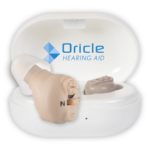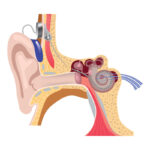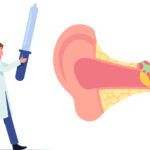Tinnitus is a medical condition characterized by hearing constant ringing, buzzing, or other sounds in the ears or head that are not present in the environment. It is a common problem that affects millions of people worldwide.
Although tinnitus is not a disease itself, it is often a symptom of an underlying medical condition, such as hearing loss, ear infections, or a side effect of certain medications. In this blog post, we will discuss the symptoms, diagnosis, treatment, and counseling options available for tinnitus.
Tinnitus Symptoms:
The most common symptom of tinnitus is hearing sounds in the ears or head that are not present in the environment. These sounds can be described as ringing, buzzing, hissing, or whistling. They can vary in pitch and loudness and can be continuous or intermittent. Some people may also experience a feeling of fullness in the ears or dizziness. Tinnitus can be unilateral (in one ear) or bilateral (in both ears). The severity of tinnitus can vary from person to person, and it can be a mild annoyance or a significant interference with daily life.
Treatment options for Tinnitus

There is no cure for tinnitus, but there are several treatment options available that can help manage its symptoms. The treatment of tinnitus depends on the underlying cause and the severity of the symptoms.
- Medications: In some cases, medications such as antidepressants, antianxiety drugs, or antihistamines may be prescribed to alleviate the symptoms of tinnitus.
- Sound therapy: Sound therapy involves the use of white noise, music, or other sounds to mask or distract from the tinnitus sound. This can be done using special devices such as hearing aids, sound generators, or apps.
- Cognitive-behavioral therapy: Cognitive-behavioral therapy (CBT) is a type of therapy that helps patients change their negative thoughts and behaviors related to tinnitus. CBT can be effective in reducing the severity of tinnitus symptoms and improving the quality of life.
- Tinnitus retraining therapy: Tinnitus retraining therapy (TRT) is a type of therapy that combines sound therapy with counseling. TRT aims to teach patients how to habituate to the tinnitus sound and reduce their emotional response to it.
- Alternative therapies: Some alternative therapies, such as acupuncture, hypnosis, or herbal remedies, have been suggested as possible treatments for tinnitus. However, there is limited scientific evidence to support their effectiveness.
Diagnosis of Tinnitus
During the diagnosis of your tinnitus symptoms, your GP will ask you questions about your symptoms, your medical history, and any medications that you are taking. He will also examine your ears and conduct a hearing test to see if the ringing is present. He will also examine your hearing to make sure that you do not have any underlying conditions that may be causing your tinnitus. If he believes that the problem is not caused by a medical condition, he or she may refer you to an otolaryngologist, an expert in the fields of ears and nose.
ENT doctors and audiologists are trained to evaluate a patient's hearing. While a doctor cannot detect most types of tinnitus through a hearing test, some may be able to hear the noise with a stethoscope. If the noise is accompanied by other symptoms, the audiologist may order imaging tests to determine the cause. Depending on your medical history and physical examination, a hearing test is not always required to diagnose tinnitus.
Other common causes of tinnitus are traumatic head injuries, cholesteatoma, or middle-ear bone growth. In some cases, tinnitus can be a warning sign of other serious medical conditions, such as Meniere's disease. When tinnitus is not a symptom of an underlying medical condition, a physician may order imaging tests to identify the cause.
Although tinnitus symptoms can develop gradually over time, they can also occur suddenly. People who have tinnitus will typically experience short episodes of ringing or other sounds after being exposed to loud noises. However, the majority of people with tinnitus do not have any other underlying medical conditions. They typically experience tinnitus during periods when they are listening to music or talking to someone loudly.
People with tinnitus may experience the noise of ringing, buzzing, hissing, or pulsing in one or both ears. The volume and frequency of the sound may vary and may be high or low. The noise can be soft or loud, pulsing, or steady. People with tinnitus may also experience loss of hearing. Treatment for tinnitus may include the use of sound-masking devices, medication, or techniques to cope with noise.
Diagnosis of Tinnitus is important for a patient's overall health and quality of life. Although many people report hearing loss, 40% of Canadians experience some form of tinnitus at some point in their lives. When the symptoms are severe and disruptive to a patient's quality of life, a doctor should diagnose and treat the underlying problem. The most common treatments include reassurance and conservative measures.
A doctor will use the findings of these studies to determine the underlying cause of tinnitus. Other sources of research include meta-analyses, randomized controlled trials, and clinical trials. A comprehensive search will yield a number of articles that provide level II evidence. A good way to begin your search is by looking through articles on the Internet. In addition to reviewing scholarly research, you can find other helpful information for your tinnitus symptoms.
Counseling

Before you can get treatment for tinnitus, you should evaluate your overall health. Assess your sleep pattern and exercise routine. Avoid loud noises and excessive alcohol. Make sure you use hearing aids or special earmuffs. Counseling for tinnitus may help you cope with the symptoms. Using sound therapy or background music to mask the sounds can also help you cope. If you experience frequent bouts of tinnitus, talk to your doctor about possible lifestyle changes that will help you live a happy and healthy life.
In some cases, tinnitus is a symptom of another condition. In such cases, your doctor may prescribe therapy for the underlying condition. In addition to counseling, you can try removing excess earwax that can cause the problem. Behavioral therapies and cognitive-behavioral therapy can help you cope with the emotional effects of tinnitus. However, if you have a severe case of tinnitus, you should seek immediate medical care.
In most cases, tinnitus symptoms are subjective, although some are objective. If you have a heart murmur, for example, you may hear a whooshing sound with every heartbeat. A stethoscope can detect this sound. A patient with non-pulsatile tinnitus may hear an actual heartbeat. But the majority of tinnitus sufferers have a more serious condition. It can interfere with concentration and make it difficult to hear external sounds.
Your doctor may send you to an otolaryngologist or hearing specialist. They can perform a physical exam to determine if the problem is related to a medical condition. They may also perform a tympanogram to assess the stiffness of the eardrum in the middle ear and determine whether it is functioning normally. This procedure is non-invasive and rarely painful. If the problem persists, you may need to see an ear, nose, and throat specialist.
Symptoms of tinnitus may get better on their own, or your condition may worsen. Seeking medical advice for tinnitus is an essential step toward finding the underlying cause and learning how to cope with the symptoms. A visit to a general practitioner (GP) can also help you to determine if your symptoms are related to a more serious medical condition. A GP can assess your ears to detect hearing loss or an ear infection.
Another cause of tinnitus may be a result of hearing loss, a condition that can occur as a result of long-term exposure to loud noises. Sometimes, the ear canal becomes blocked, which can alter the function of the eardrum. Among other things, blockages can be caused by earwax, inner ear hair, and ear infections. If the blockage is severe enough, it can cause earwax, inner ear hair, or earwax.
Conclusion
Tinnitus is a common problem that can significantly affect a person's quality of life. Although there is no cure for tinnitus, there are several treatment options available that can help manage its symptoms. The treatment of tinnitus depends on the underlying cause and the severity of the symptoms.
Patients with tinnitus should seek medical attention to rule out any underlying medical conditions and discuss treatment options with their healthcare provider. Counseling can also be an effective way to help patients cope with the emotional and psychological effects of tinnitus.
By working with a mental health professional, patients can learn coping strategies, stress reduction techniques, and ways to improve their sleep, which can help alleviate the negative impact of tinnitus on their daily life.
Sources
- American Tinnitus Association. (2021). Understanding Tinnitus. Retrieved from https://www.ata.org/understanding-facts
- Mayo Clinic. (2021). Tinnitus. Retrieved from https://www.mayoclinic.org/diseases-conditions/tinnitus/diagnosis-treatment/drc-20350162
- National Institute on Deafness and Other Communication Disorders. (2020). Tinnitus. Retrieved from https://www.nidcd.nih.gov/health/tinnitus
- American Academy of Otolaryngology-Head and Neck Surgery. (2021). Tinnitus. Retrieved from https://www.enthealth.org/conditions/tinnitus/







